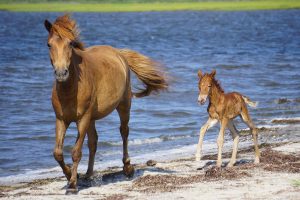
ASSATEAGUE — Assateague Island officials are again reminding visitors not to feed the barrier island’s famed horses and to carefully cover up all food after a mare died last week from ingesting a large amount of dog food.
Last Thursday, the seven-year-old mare Chama Wingapo was found dead in the campground at the Assateague Island National Seashore (AINS). There was no sign of visible external injuries, but further investigation revealed Chama Wingapo had ingested a large amount of dog food as early as last Wednesday. Incidentally, Chama Wingapo was one of five mares to birth a foal during the island’s baby boom last summer.
It was determined the large amount of dog food caused an impaction, or blockage, resulting in a rupture of the intestine. Chama Wingapo’s tragic passing resulted in AINS officials this week to reiterate the importance of carefully storing human and pet food from the island’s wild horses and other wildlife. The horses are familiar sites around the populated areas of the barrier island and interact with humans, often raiding picnic baskets and coolers sometimes with deadly results as evidenced by the mare sudden death last week.
Most dog food contains corn, soybean and animal products with very carbohydrate, protein and fat content. The pet food is too rich for the wild horses and, in large amounts, can be deadly. The horse’s natural forage includes low nutrient, high fiber saltmarsh and beach grasses.
“Sadly, this incident demonstrates that a fed horse is a dead horse,” said AINS Chief of Interpretation and Education Liz Davis. “While the dog food may not have been given directly to the horse, the dog food was not properly stored away from the horses and other wildlife. All food, including your pet’s food, must be properly stored. This tragic incident could have been prevented by simply storing pet food in a vehicle.”
Davis reiterated the importance of keeping all human and pet food stored in tamper-proof containers and out of the reach of the wild horses.
“We are all visitors here at Assateague,” said Davis. “Protect the resident wildlife including the wild horses by following a few simple rules during your visit. Take responsibility for every item you bring on the island.”
Assateague officials offered a few common sense tips for carefully covering food and keeping it out of harm’s way. For example, the horses can open snap-on lids and latches on coolers and other containers. Simply storing a cooler or food container under a picnic table does not keep a horse from accessing it. Coolers should be secured with a nylon strip to keep horses from opening them.
Secure all tote bags and beach bags with a zippered closure. Horses can easily open most tote and beach bags. When in doubt, store all unattended food in a vehicle, including pet food. Do not leave pet food bowls and water bowls unattended. If having lunch or a meal, wait until after the horses have moved away to begin. Also, store all trash in readily-accessible dumpsters immediately. The horses are attracted to the smell from food wrappers and other containers

